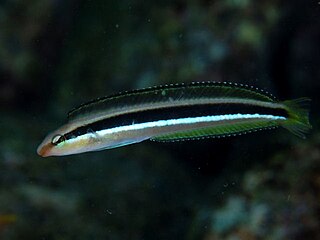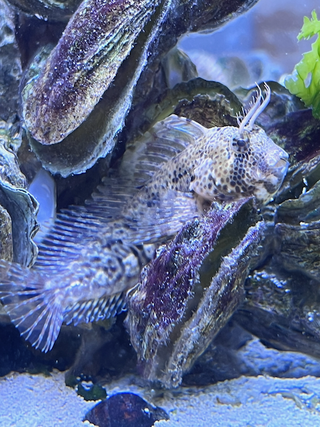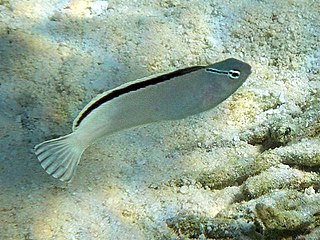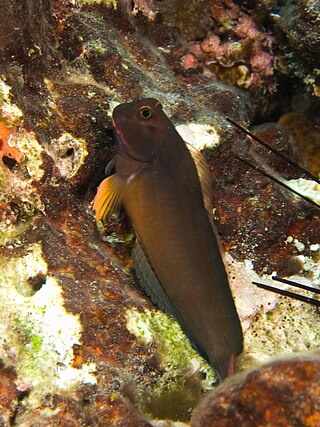
Malacoctenus boehlkei, the Diamond blenny, is a species of labrisomid blenny native to the central western Atlantic Ocean and the Caribbean Sea where it is an inhabitant of coral reefs at depths of from 5 to 70 metres. This species can reach a length of 6.4 centimetres (2.5 in) TL. The specific name honour the ichthyologist James E. Böhlke (1930-1982), of the Academy of Natural Sciences of Philadelphia.

Aspidontus dussumieri, the lance blenny or Dussumier's blenny, is a species of combtooth blenny found in coral reefs in the Pacific and Indian Oceans. The specific name honours the French explorer and merchant Jean-Jacques Dussumier (1792-1883).
Cirripectes springeri, Springer's blenny or the spotted eyelash blenny, is a species of combtooth blenny found in coral reefs in the western Pacific Ocean. This species reaches a length of 10 centimetres (3.9 in) TL. The specific name honours the American ichthyologist Victor G. Springer of the United States National Museum who has worked extensively on blennies.
Hypleurochilus langi is a species of combtooth blenny found in the eastern Atlantic ocean, from Senegal to the mouth of the Congo River. This species grows to a length of 7 centimetres (2.8 in) SL. This blenny is euryhaline and it enters mouths of large rivers and occurs among mangroves, it prefers brackish water. The specific name of this blenny honours the German zoologist and taxidermist Herbert Lang (1879-1957) of the American Museum of Natural History, who helped to collect the type.

Hypleurochilus springeri, the orange-spotted blenny, is a species of combtooth blenny found in coral reefs in the Caribbean Sea. This species grows to a length of 5 centimetres (2.0 in) TL. The specific name honours the American ichthyologist Victor G. Springer.

Hypsoblennius hentz, commonly known as the feather blenny, is a species of combtooth blenny found on coral reefs in the western Atlantic Ocean. This species grows to a length of 10 centimetres (3.9 in) total length. The feather blenny is found from Nova Scotia, Canada to Texas along the shore of North America. Often, feather blennies can be found in oyster reefs and rocky shores. The identity of the person honoured in this species' specific name is uncertain but it is thought that to have been the French American arachnologist Nicholas Marcellus Hentz (1797-1856) who is the "Mr Hentz" from Charleston, North Carolina who sent the type to Lesueur.

Meiacanthus smithi, the disco blenny, is a species of combtooth blenny found in coral reefs in the eastern Indian Ocean. This species grows to a length of 8.5 centimetres (3.3 in) TL. It is also commonly known as Smith's fangblenny, Smith's sawtail blenny or Smith's harp-tail blenny. This species is also found in the aquarium trade.

Ophioblennius macclurei, the redlip blenny, is a species of combtooth blenny found in coral reefs in the western Atlantic ocean. This species reaches a length of 12.2 centimetres (4.8 in) TL. The specific name honours the American comparative anatomist and embryologist Charles Freeman Williams McClure (1865-1955) in recognition of his work on the lymphatic systems of fishes.

The longstriped blenny is a species of combtooth blenny found in the northeast Atlantic off Portugal, also known from the northern Mediterranean. This species reaches a length of 8 centimetres (3.1 in) TL. The identity of the person honoured by the specific name of this species was not specified but is thought to be the French painter and naturalist Jean Louis Florent Polydore Roux (1792-1833).
Petroscirtes thepassii, the Thepas' sabretooth blenny or the Thepas' fangblenny, is a species of combtooth blenny found in the western central Pacific ocean. This species reaches a length of 5.9 centimetres (2.3 in) SL. The specific name of this blenny honours the collector of the type, the military surgeon A.H. Thepass.

Salarias patzneri, Patzner's blenny, is a species of combtooth blenny found in coral reefs in the western central Pacific ocean. This species can reach a length of 5.5 centimetres (2.2 in) TL. The specific name honours the Austrian ichthyologist Robert A. Patzner who worked on the genitalia of blennies and who shared specimens with Hans Bath.
Scartella springeri is a species of combtooth blenny found in the eastern Atlantic Ocean, around St. Helena. This species reaches a length of 8.2 centimetres (3.2 in) SL. The specific name honours the American ichthyologist Victor G. Springer of the U.S. National Museum.

Acanthemblemaria chaplini, the papillose blenny, is a species of chaenopsid blenny found in the western Atlantic ocean. It can reach a maximum length of 4.5 centimetres (1.8 in) TL. The specific name honours the ichthyologist Charles C. G. Chaplin (1906-1991).

Acanthemblemaria greenfieldi, the false papillose blenny, is a species of chaenopsid blenny found in coral reefs in the western Atlantic ocean. The specific name honours the American ichthyologist David W. Greenfield who identified this species a something new but gave his material to the authors.

Acanthemblemaria johnsoni, the white-cheeked blenny, is a species of chaenopsid blenny found in coral reefs around Tobago, in the western central Atlantic ocean. The specific name honours the ichthyologist G. David Johnson Curator of the Division of Fishes at the Smithsonian Institution.
Emblemaria caldwelli, the Caribbean blenny, is a species of chaenopsid blenny found in coral reefs around the Bahamas, Belize, Honduras and Jamaica, in the western central Atlantic ocean. The specific name honours David K. Caldwell, Director of Marineland Research Laboratory, St. Augustine, Florida in gratitude for the loan of specimens.
Emblemariopsis bottomei, the shorthead blenny or the midnight blenny, is a species of chaenopsid blenny found in coral reefs in the western central Atlantic ocean. It can reach a maximum length of 3 centimetres (1.2 in) SL. The specific name honours Peter Bottome, although who this is, is not specified but it may possibly be the Venezuelan businessman Peter Bottome Deery (1937-2016).
Stathmonotus stahli, the eelgrass blenny or the seagrass blenny, is a species of chaenopsid blenny found in coral reefs in the western Atlantic ocean. It can reach a maximum length of 4 centimetres (1.6 in) TL. The specific name honours the Puerto Rican physician and biologist Agustín Stahl (1842-1917).
Malacoctenus delalandii is a species of labrisomid blenny native to the Atlantic Ocean and the Caribbean Sea from Guatemala to Brazil. This species is an inhabitant of coral reefs being found in sandy areas and around beds of the seagrass Thalassia testudinum. It can reach a length of 8.2 centimetres (3.2 in) TL. The specific name honours the French explorer and naturalist Pierre Antoine Delalande (1787-1823), who collected the type.

Malacoctenus ebisui, the Fishgod blenny, is a species of labrisomid blenny native to the Pacific coast of the Americas from the Gulf of California to Panama. This species can reach a length of 6.5 centimetres (2.6 in) TL. The specific name refers to Ebisu, a Japanese god of fishermen, as does the common name.













